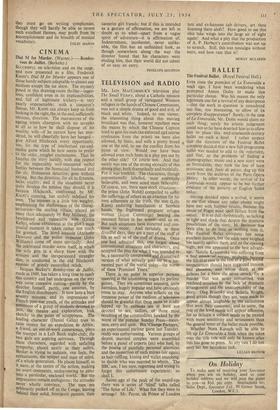CINEMA Dial M for Murder. (Warner.)—Rendez- vous de &inlet. (Berkeley.)
SUCCESSFUL on television and on the stage, and now presented as a film, Frederick Knott's Dial M for Murder appears one of those handy subjects adaptable to almost any medium except the ice show. The mystery Posed in this drawing-room thriller—ingen- ious, confident even in its implausibilities, and full of legitimate trickery—is very nearly impenetrable; with a conjuror's finesse, Mr. Knott can always keep us from looking in the right, the, in the end, sufficiently Obvious, direction. The manceuvres of the ageing tennis champion with no scruples at all as to how he shall dispose of his wealthy wife—if he cannot have her mur- dered, he will cheerfully have her hanged— give Alfred Hitchcock every opportunity, too, for the type of intellectual cat-and- Mouse game which he how seems to prefer
• to the older, rougher excitements. That he handles the story lucidly, with due respect for the impeccably well-mannered verbal battles between the homicidal husband and the sly, Holmesian detective, goes without saying. But the direction, for all its firmness, lacks vitality; and if the situations never quite develop the tension they should, it is because Hitchcock, confronted by Mr. Knott's cunning, has unduly subdued his own. The manner is a little too weighty, emphasising the shallowness of the charac- terisation—the smiling villain, played no more than adequately by Ray Milland; the bewildered and vulnerable wife (Grace Kelly), whose obtuseness at the plot's most crucial moment is taken rather too much for granted. The hired assassin (Anthony Dawson) and the police inspector (John Williams) come off more spiritedly. And the celebrated murder scene itself, in which the wife gets in a sharp blow with the scissors and the inexperienced strangler dies, is conducted in the old Hitchcock manner of grimly controlled relish.
Jacques Becker's Rendez-vous de Jolliet, made in 1949, has taken a long time to reach this country and has undergone on the way way some extensive cutting—partly by the director himself, partly, one assumes, by the English distributors. It now lasts a bare seventy minutes, and its impressions of French post-war youth, of the attitudes and ambitions of a group of students devoted to jazz, the theatre and exploration, look sketchy to the point of scrappiness. The leading character (Daniel Gain) tries to raise money for an expedition tb Africa: a friend, an out-of-work cameraman, plays the trumpet in a Left Bank night-club; the two girls are aspiring actresses. Through these characters, regarded with unfailing sYmpathy, placed neatly in their milieu, Becker is trying to indicate, one feels, the enthusiasms, the temper and state of mind, of a whole generation. He places himself, as it were, at the centre of the action, making no overt comments, endeavouring to enter into a particular, enclosed world. But the impressions remain ambiguous; the attitudes never wholly convince. The men are arbitrarily packed off to the Congo, leaving behind their solid, bourgeois parents, their careerist girl friends; but if this is intended as a gesture of affirmation, we are left in doubt as to what—apart from a vague spirit of adventure—it is affirmation of. Indeterminate, incoherent, never unlike- able, the film has an unfinished look, as though somewhere along the way the director found that his characters were eluding him, that their world did not admit of so easy an entry.
PENELOPE HOUSTON


































 Previous page
Previous page